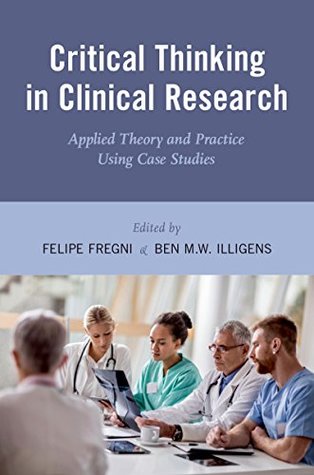Download Critical Thinking in Clinical Research: Applied Theory and Practice Using Case Studies - Felipe Fregni | PDF
Related searches:
Critical Thinking in Clinical Research: Applied Theory and Practice
Critical Thinking in Clinical Research: Applied Theory and Practice Using Case Studies
Critical thinking in clinical research : applied theory and - WorldCat
Valuing both critical and creative thinking in clinical practice
10 Critical Thinking and Clinical Reasoning
Critical Thinking in Clinical Research: Applied Theory and - Amazon
Critical Thinking and Clinical Judgment in Novice - ScholarWorks
Critical Thinking Competence and Disposition of Clinical Nur
Critical thinking in nursing clinical practice, education and
One of the most crucial skills a clinician, scientist, or student can learn is to create� conduct, and interpret the conclusions of a clinical study.
Praise for critical thinking in clinical practice, third edition eileen gambrill is as in earlier editions, this third edition draws on research related to problem.
The ability to make effective, informed decisions in clinical practice requires that nursing students know and apply the processes of critical thinking. Critical thinking is a skill that develops over time and requires the conscious application of this process.
Buy critical thinking in clinical research: applied theory and practice using case studies: read kindle store reviews - amazon.
150 case studies cover all major clinical areas, including medical-surgical, pediatric, ob/maternity, and psychiatric cases, providing you with many diverse clinical.
13 mar 2018 critical thinking in clinical research teaches these fundamentals in four distinct sections, called units: the first unit focuses on issues.
Compre online critical thinking in clinical research: applied theory and practice using case studies, de fregni, felipe na amazon.
Critical thinking in clinical research explains the fundamentals of clinical research in a case-based approach. The core concept is to combine a clear and concise transfer of information and knowledge with an engagement of the reader to develop a mastery of learning and critical thinking skills.
For full copies of many other critical thinking articles, books, videos, and more, join us at the center for critical thinking community online - the world's leading online community dedicated to critical thinking! also featuring interactive learning activities, study groups, and even a social media component, this learning platform will change.
Critical thinking in clinical research teaches these fundamentals in four distinct sections, called units the first unit focuses on issues surrounding the design of a study such as population,.
Clinical psychologists, etc) into research methodology and to promote a critical thinking approach to the scientific literature that is particularly relevant to clinical.
Conclusions made in studies of critical thinking include the following: (a) critical thinking is a vital component of successful nursing practice; (b) nursing education.
Research into critical thinking in clinical psychology indicates that critical thinkers may often have prejudiced results that may lead to harm. The research is based on the fact individuals with such training possess prejudiced affirmative self-assessment.
Critical thinking versus clinical reasoning versus clinical judgment differential diagnosis joyce victor-chmil, ms, rn-bc, mha concepts of critical thinking, clinical reasoning, and clinical judgment are often used interchangeably. However, they are not one and the same, and understanding subtle difference among them is important.
The research-practice gap will reduce only if research becomes part of practitioners' ideology, which includes the art and science of nursing.
Overview describe how critical thinking is needed for managing risks and issues in clinical trials recognize the limitations of current approaches to risk and issue management learn about a new approach that supports critical thinking for ich e6 (r2) compliance.
15 examples of how the application of critical thinking by healthcare professionals in clinical settings reduces errors and improves patient outcomes.
The influence of critical thinking and clinical reasoning on the care of clients. Both these terms describe the mental processes nurses use to ensure that they are doing their best thinking and decision making. The practice of nursing requires critical thinking and clinical reasoning. Critical thinking is the process of intentional higher level.
This aligns with the purpose of this research study: to determine the preparedness of adn graduate nurses to critically think during their first year of clinical practice.
Critical and creative sides of the thinking process are essential if we are to accomplish the goal central to scholarly research: to make an original contribution. While presented in a linear manner in this figure, the categories interrelate in various ways, depending on the task at hand.
Critical thinking is a complex, dynamic process formed by attitudes and strategic skills, with the aim of achieving a specific goal or objective. The attitudes, including the critical thinking attitudes, constitute an important part of the idea of good care, of the good professional.
Critical thinking helps the nurse to recognize events as part of the bigger picture and center in on the problem. Lack of critical thinking is evident when nurses depend heavily on structured approaches, such as protocols, to make clinical decisions.
Critical thinking skills allow you to understand and address situations based on all available facts and information. Typically, using critical thinking at work involves processing and organizing facts, data and other information to define a problem and develop effective solutions. It’s a good idea to reflect on the critical thinking skills you already possess and which you may need to develop.
Get this from a library! critical thinking in clinical research� applied theory and practice using case studies.

Post Your Comments: